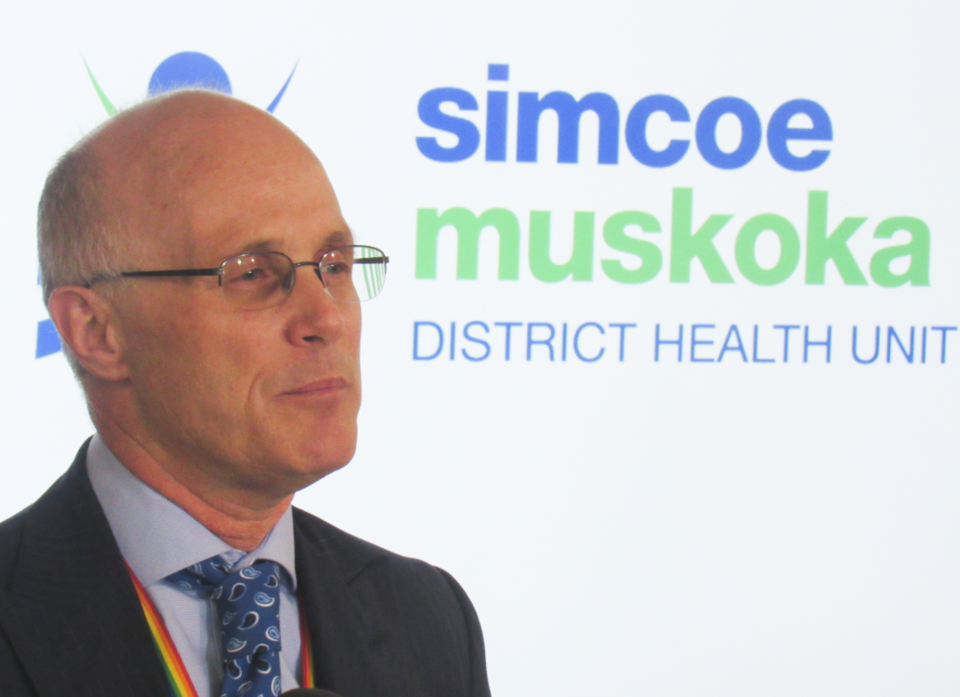The region’s medical officer of health is asking people to “double-down” and comply with infection control measures in order to curb community transmission of the coronavirus.
Dr. Charles Gardner, medical officer of health for the Simcoe Muskoka District Health Unit, said COVID-19 has proven highly-contagious and even strict control measures have varying impacts on slowing its spread. Yet, those control measures are important to keep the number of active cases in Simcoe-Muskoka communities from continuing to rise.
As more COVID-19 cases are confirmed in Simcoe-Muskoka, there’s a domino effect that is leading to severe symptoms and even death.
“You get a series of slopes, rises, or waves that happen,” said Gardner. “The first wave is transmission of people as cases. Following that, people get sicker, requiring a hospital … the third wave is deterioration and admittance into the intensive care unit, and among them a number then require ventilation. Beyond that, you would see deaths happening.”
The number of active cases in the Simcoe-Muskoka region has jumped to more than 620 this week from about 350 last week.
The health unit reported 310 new cases between Dec. 13 and 19, and according to the region’s epidemiological team, at least 232 of those were symptomatic. The other 51 confirmed cases (18 per cent) were asymptomatic, but were high-risk, close contacts of other cases. The remaining cases didn’t have symptom data reported.
“Certainly there has been documentation of transmission from asymptomatic people, and they still carry a significant risk of transmitting to other people,” said Gardner.
He said it’s likely public health reports are missing more asymptomatic cases than they are catching.
“We miss more cases in the community than we know of,” he said. “Because they don’t have symptoms, they don’t get tested … it takes you right back to the importance of people practising, in a universal way, these infection prevention and control measures.”
Gardner called COVID-19 a highly-infectious disease, and noted the potential to transmit to other people, even without symptoms, is “substantial.”
He warned Simcoe-Muskoka, Ontario, and the world faces a serious situation as it struggles to contain the spread of COVID-19 while a vaccine can be distributed.
And though inoculation has begun, a new, more contagious strain has been identified in the United Kingdom, and case incidence rates are higher than ever both regionally and in Ontario.
“Cases have certainly not peaked in Ontario,” said Gardner. “I believe our rise might have been much steeper still had there not been regional restrictions to try and control it, but it’s still rising.”
In part, that rise can be attributed to the contagious nature of the virus.
“This has been, all along, a highly contagious virus,” said Gardner. “The control measures we’ve used have only affected it to a degree.”
Yet, the control measures are proving effective at infection control.
“We’ve found transmission of other respiratory viruses, including influenza, has completely dropped,” he said. “The things we’ve been doing to try and stop COVID-19, and having had mixed impacts, have been highly effective against other respiratory viruses. That really tells you just how contagious the virus is, let alone this strain of the virus that is even more contagious.”
The strain identified in the UK hasn’t been shown to be more virulent or deadly than the original strain, but there are indications it is more transmissible.
He said it will be very difficult to control an even more contagious strain of COVID-19, but he is optimistic the vaccines will help and will be effective against the new strain as well.
The health unit is asking all residents to stay home and self-isolate if they are experiencing symptoms of illness, to avoid contact with anyone outside their household, to practise physical distancing with anyone outside of your home, to wear a face-covering in public, to limit trips outside of your home to essential reasons only, to wash your hands frequently, and to complete a self-assessment before going to work or school.
